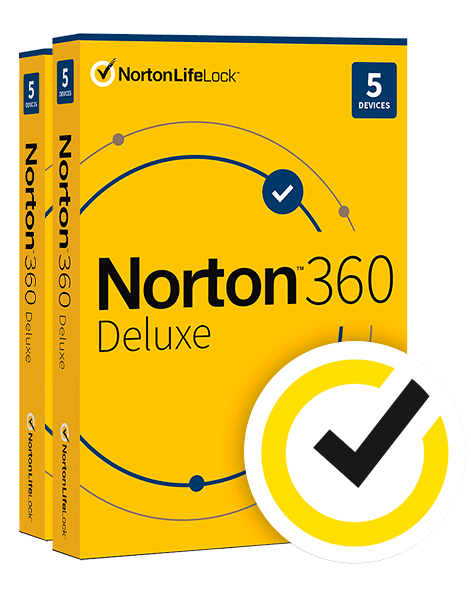Norton vs Trend Micro: Which Antivirus Is Better in 2024?
Norton and Trend Micro are two of the most competitive antiviruses on the market today. Both have been in the industry for years, so I was curious to see which one had adapted best to meet consumer demands. To get to the bottom of this, I decided to test both of them out to see which one would emerge the victor in this showdown.
I tested both contenders across 15 categories, gauging their features, ease of use, price, and other important factors. After rigorous evaluation, I concluded that Norton outperformed Trend Micro in almost every avenue.
Norton provides perfect detection scores and real-time protection while offering a wide array of features that give your computer airtight security. It also offers many useful extras, including a VPN, parental controls, a password manager, and much more. I highly recommend you try it out risk-free with its 60-day money-back guarantee.
No Time? Here’s a 1-Minute Summary of Category Winners
Although Trend Micro is a decent antivirus with great malware-detection capabilities, it doesn’t offer many essential features and loses out to Norton’s perfect detection scores and real-time protection.
 |
 |
|
| Virus Scanner | Detected 100% of viruses and scanned my PC lightning-fast. | Detected 100% of viruses but provided an average scanning speed. |
| Real-Time Malware Protection | Detected all EICAR virus samples and blocked all malicious websites and downloads. | Detected only 4 of 7 EICAR virus samples and blocked all malicious websites and downloads. |
| System Performance | Uses minimal system resources and offers fast scans. | Uses substantial system resources but still offers slow scans |
| VPN | Provides excellent speeds on nearby and mid-range servers and hosts 30+ servers. | Provides good speeds on nearby servers but not on midrange and distant servers. |
| Parental Controls | Monitors up to 15 child profiles. | Monitors up to 5 child profiles. |
| Firewall | Hosts a highly configurable and intelligent firewall with advanced features. | Doesn’t have an in-built firewall. It only has a feature that boosts Windows Defender. |
| Password Manager | Offers an advanced password manager with airtight security and a superior auto-fill function. | Offers a decent password manager, but it doesn’t offer exceptional security and isn’t so well-integrated. |
| Gaming Mode | Has resource optimization that suspends background activities to allocate more resources while gaming. | Has a “Mute” mode, which silences all non-essential notifications, but no game booster. |
| Optimization Tools | Provides ample tune-up tools, including Optimize Disk and Startup Manager | Offers plenty of optimization tools, and its Quick Scan detects performance issues. |
| Other Features | Additionally offers cloud storage on all its plans | Additionally offers “Fraud Buster” and “Privacy Protection” features |
| Device Compatibility | Norton’s desktop and mobile apps are easy to use and compatible with a greater range of OS versions. | Trend Micro’s desktop and mobile apps are user-friendly but are compatible with a shorter range of OS versions. |
| Customer Service | Provides 24/7 live chat, phone support, and a community support forum. | Provides 24/7 live chat, phone support, email support, and a community support forum. |
| Price | Good value for money on mid-tier plans that pack a ton of features. | Overpriced relative to the few features it offers. |
| Free Version | Doesn’t have a free version. | Doesn’t have a free version but provides some free apps and tools. All plans come with a 30-day free trial. |
| Money-Back Guarantee | Provides a 60-day money-back guarantee | Provides a 30-day money-back guarantee. |
How I Tested and Compared Norton vs Trend Micro
- Virus Scanner — I looked at what types of scans each contender offers and tested their detection scores across multiple scanning tests.
- Real-Time Malware Protection — I checked whether each antivirus has real-time protection features, such as a browser extension, to detect viruses in real-time.
- System Performance — I tested how resource-heavy each antivirus is in terms of CPU and disk utilization.
- VPN — I judged each antivirus’ in-built VPN based on its streaming abilities and the speeds it provides.
- Parental Controls — I considered which antivirus provides more easy-to-use and feature-rich parental controls.
- Firewall — I checked if each antivirus hosts a firewall and whether it has advanced features for providing better security.
- Password Manager — I examined each contender’s password manager in terms of ease of use and superior auto-fill functions.
- Gaming Mode — I checked the contenders’ gaming modes, how many features/modes they offer, and how well they allocate system resources while gaming.
- Optimization Tools — Optimization tools are a must-have for any antivirus. I considered how many tune-up tools each antivirus offers.
- Other Features — I accounted for the useful extras Norton and Trend Micro provide in their plans.
- Device Compatibility — I checked which operating systems (and their versions) each antivirus supports and how user-friendly are their desktop and mobile apps.
- Customer Service — I tested various customer support options for each contender and evaluated response times and ease of reaching out to the support team.
- Price — I compared the price plans of each contender to determine which plan offers the best value for money.
- Free Version — I checked for any free plans that the contenders have to offer (including a free trial).
- Money-Back Guarantee — I tested each antivirus’s refund policy first-hand.
1. Virus Scanner — Norton Provides Perfect Detection Rates
Norton’s virus scanner outperforms Trend Micro’s in all aspects — it’s faster, more accurate, and has minimal impact on system performance. It provides 3 scan options — Quick Scan, Custom Scan, and Full Scan.
I ran Norton’s Full Scan and it detected 100% of the viruses I had planted on my testing machine, such as rootkits, trojans, and spyware. It took just 8 minutes for the full scan to complete, which was impressive since many other antiviruses took half an hour or even an hour to complete a full scan. More impressively, Norton’s Quick Scan only took 2 minutes!
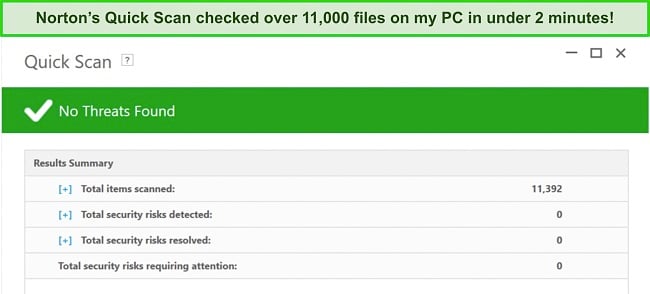
Next, I tested Trend Micro’s virus scanner and was pleased to see that its full scan detected 100% of the viruses. However, it was much slower compared to Norton, both in the number of files it scanned and the time it took to scan them.
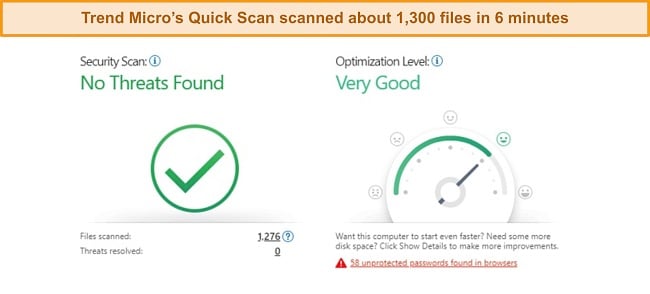
Its full scan took 22 minutes to complete and checked 438,000 files. That’s the kind of speed you can expect from an average antivirus, so I was neither too happy nor dissatisfied with it. Norton’s full scan checked more than 900,000 files in under 10 minutes — that’s 4 times Trend Micro’s scanning speed!
I was impressed that neither Norton nor Trend Micro gave me false positives by flagging legitimate files. Overall, both are solid contenders with exceptional virus scanning abilities, but Norton takes the lead in this round because of its lightning-quick scan speeds and minimal impact on system performance compared to Trend Micro.
Virus Scanner Winner: Norton 360
2. Real-Time Malware Protection — Norton Offers Perfect Threat Protection in Real-Time
Norton provides far more robust real-time protection than Trend Micro. To test out their real-time threat protection capabilities, I planted a bunch of EICAR (European Institute of Computer Antivirus Research) virus samples on my PC.
I tested each contender to see if they could detect my virus samples in real-time. Norton blocked all virus samples I threw at it, providing perfect real-time protection.
| Test File | EICAR Sample 1 | EICAR Sample 2 | EICAR Sample 4 | EICAR Sample 4 | Live Sample 1 (Adware) | Live Sample 2 (Trojan) | Live Sample 3 (Trojan) |
| Norton | Blocked | Blocked | Blocked | Blocked | Blocked | Blocked | Blocked |
| Trend Micro | Blocked | Allowed | Allowed | Allowed | Blocked | Blocked | Blocked |
Norton passed my tests with flying colors, blocking all malware samples I pitted it against. On the other hand, Trend Micro gave me a detection score of 57%. It couldn’t detect samples 2 through 4, which contained fragments of malicious files hidden inside a zip folder.
Norton’s excellent real-time protection features are further enhanced by the Safe Web browser extension. This extension is designed to work seamlessly with Chrome, Firefox, Safari, and Edge. It effectively prevents me from accessing hazardous websites and downloading malicious files online. In fact, when I unintentionally downloaded a contaminated file, Norton promptly isolated it to safeguard my computer.

Trend Micro features a browser extension that keeps malicious and phishing websites at bay. I used it and blocked all potentially dangerous websites I tried visiting and malicious downloads. It also has a WiFi identification feature that detects if you’re connected to an unsafe network.
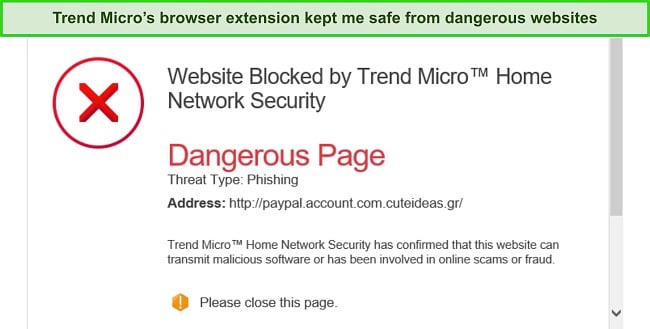
Overall, both Norton and Trend Micro provide exceptional online real-time protection. However, when it comes to offline protection, Norton wins the round because it blocked all virus samples in my extensive tests, whereas Trend Micro couldn’t detect stealthy virus fragments hiding inside zip files.
Real-Time Malware Protection Winner: Norton 360
3. System Performance — Norton Has Minimal Impact on System Performance
After extensively testing each contender, I concluded that Norton uses system resources more efficiently than Trend Micro. I recorded my CPU and disk utilization levels before and during scans to determine which antivirus was lighter on my PC.
Norton provided me with faster scan speeds using the same system resources.
| Test Type | Control CPU Utilization % (no scan) | Control Memory Utilization % (no scan) | Control Disk Utilization (MB/s)(no scan) | Full Scan CPU Utilization % | Full Scan Memory Utilization % | Full Scan Disk Utilization (MB/s) |
| Norton | 14 | 72 | 13 | 84 | 75 | 381 |
| Trend Micro | 59 | 71 | 2 | 77 | 63 | 10 |
My baseline CPU utilization levels for Norton and Trend Micro were 14% and 59%, respectively. Even without a scan Trend, Micro took up more than half of my CPU resources.
My CPU utilization levels spiked to 84% and 77%, respectively, when I ran the full scan. This was a surprising result for me, and I was expecting Trend Micro to be more resource-intensive than Norton with a scan. Although Norton was slightly heavier on my system than Trend micro during a scan, it was 38 times faster, which explains why its scans are so fast.
I wanted to see if these numbers translated into my experience, so I installed resource-heavy apps like Adobe suite and AutoCAD while using Norton and Trend Micro. I didn’t experience a significant slowdown using Norton (with and without scan), and I could even stream Netflix without any problems. Meanwhile, Trend Micro’s full scan had some toll on my PC.
Keep in mind that I have a high-end PC with a powerful CPU, so your experience might differ from mine depending on your system specs.
System Performance Winner: Norton 360
4. VPN — Norton’s VPN Provides Fast Speeds
After rigorous testing, I found Norton’s VPN was better than Trend Micro’s because it offers faster speeds and better geoblocking abilities. Having said that, I wasn’t very satisfied using either, and both VPNs don’t compare to a standalone VPN like ExpressVPN.
Norton’s “Secure VPN” provided excellent speeds on nearby and mid-range servers. I used it to stream Netflix, Amazon Prime Video, and Hulu to access my home content when traveling. On distant servers, however, it was struggling to provide fast speeds consistently.
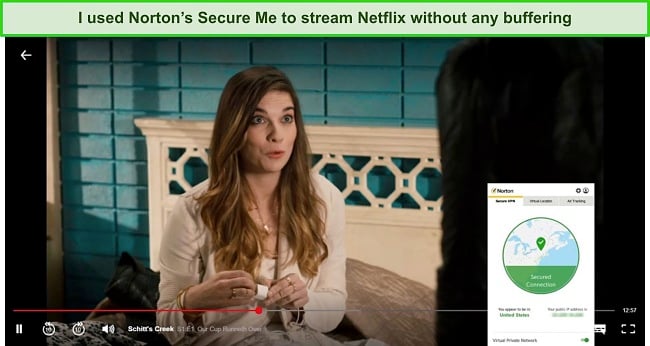
I had trouble logging into my Disney+ account using Norton’s VPN. I couldn’t even get to the login page because the platform detected I was using a VPN. Also, Norton’s VPN includes 30 servers, which isn’t a lot, so it’s not that great at unblocking geo-restricted content when you’re traveling.
Trend Micro’s VPN uses AWS (Amazon Web Services) servers, all of which are based in the US. Unfortunately, I couldn’t switch between servers and thus couldn’t access my favorite content when traveling. I could stream Netflix in HD with some buffering, but Prime Video and Hulu didn’t work at all. Although I got decent speeds on nearby servers, mid-range and distant servers gave me poor and fluctuating speeds.
VPN Winner: Norton 360
5. Parental Controls — Norton Supports up to 15 Child Profiles
Both Norton and Trend Micro provide an excellent parental controls feature, but Norton lets you create and monitor up to 15 profiles and packs more advanced features than Trend Micro.
I installed Norton’s Family app on my PC to access its parental controls and found it incredibly easy to use with an intuitive dashboard. I blocked apps and websites and even set screentime for multiple devices remotely. Additionally, you can remotely track each device’s browser history, which I think is extremely convenient for parents.
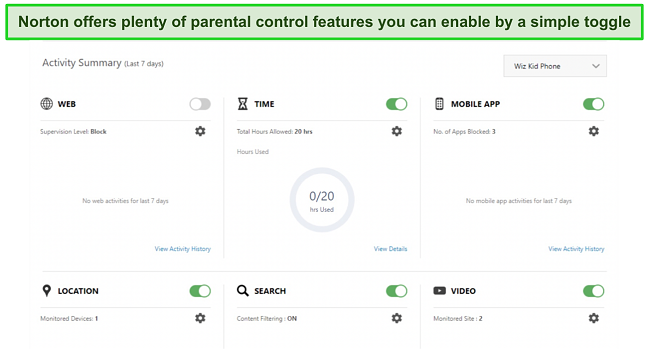
Trend Micro also features parental controls, consisting of a suite of features you can use to manage your child’s offline and online activities. I used it to block certain websites and apps on child devices. I especially liked its “Time Limits” feature, which lets you set how many hours each device can be used daily.
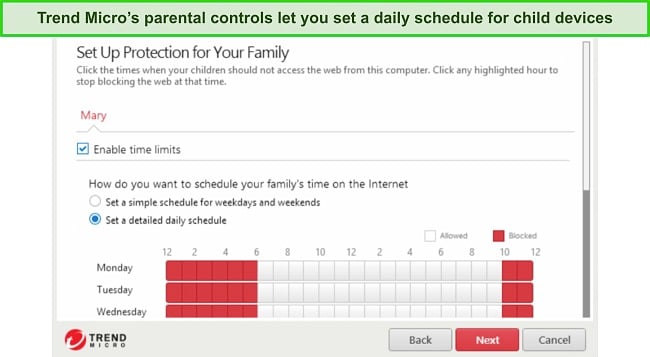
Overall, both Norton and Trend Micro provide excellent parental controls. However, I found Norton’s easier to use, whereas Trend Micro’s parental controls were a bit clunkier. Apart from that, Norton lets you create 15 child profiles, compared to Trend Micro’s 5.
Parental Controls Winner: Norton 360
6. Firewall — Norton Boasts a Highly Configurable and Advanced Firewall
Norton has one of the most advanced and powerful firewalls I’ve seen — in contrast, Trend Micro doesn’t have its own firewall, which was disappointing. Instead, it hosts a “Firewall Booster,” which enhances the Windows native firewall (Windows Defender). The problem is no matter how much you fortify Windows Defender, it’s just not good enough to keep you safe from all threats.
Norton’s intelligent firewall hosts a wide array of features for advanced users. It automatically configures itself depending on which network you’re connected to. For example, when I connected my device to a public WiFi network and opened Norton’s firewall, it blocked all incoming connections.
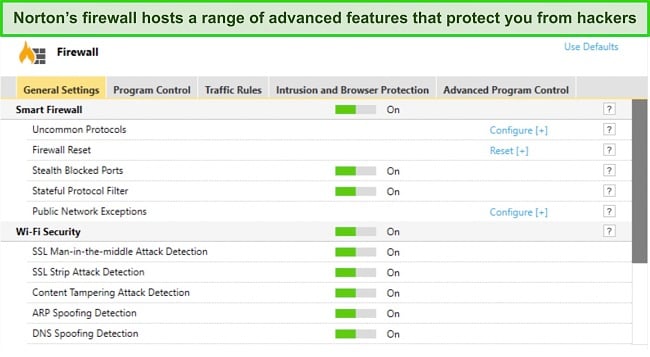
Norton’s firewall immediately notified me whenever an app attempted to connect to an external source or website. This gave me peace of mind that my PC was safe from hackers. I could also monitor and control all incoming and outgoing traffic and even set traffic rules to add an extra layer of security to my PC.
Overall, Norton’s firewall was a joy to use. It lets you set traffic rules and manage network connections, providing airtight protection for your system. I highly recommend using its Intrusion Prevention feature, which protects you from online threats and is toggled on by default.
Firewall Winner: Norton 360
7. Password Manager — Norton’s Password Manager Packs a Ton of Features
I was pleased to see that both Norton and Trend Micro include a password manager. I found Norton’s much easier to use and packed with more features. I was especially impressed by its Auto-change Password feature.
Norton’s password manager lets you store unlimited passwords, a feature you won’t find with many other antivirus password managers. You’ll have to create and remember a single master password to access your password vaults inside the password manager.
I used Norton’s password manager to generate and save passwords for multiple websites, including Netflix, Gmail, and Facebook. When I wanted to update my passwords, I used the nifty Auto-change Password feature to generate a strong password. This feature made managing my passwords so much easier.
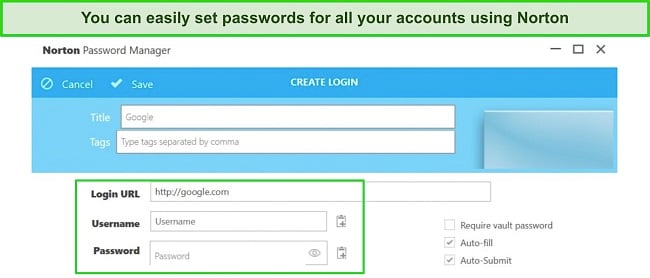
Norton’s auto-fill function works well for filling out passwords and even fairly complex web forms. I saved my address, bank account information, credit card details, and more without concern because Norton’s password manager uses AES 256-bit encryption to protect your data from prying eyes.
Apart from that, Norton’s password manager features an in-built password auditor, which checks the strength of your saved passwords and notifies you if they’re vulnerable.
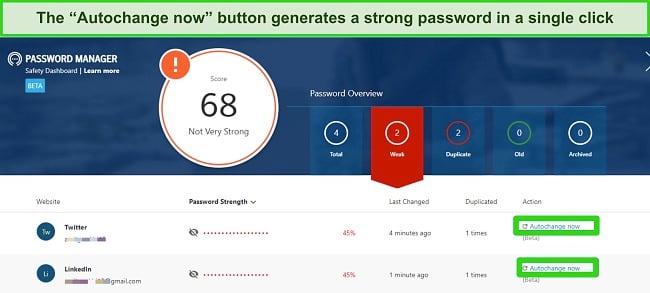
Trend Micro’s password manager has all the essential functions but lacks security features like two-factor authentication and has limited form-filling capabilities. I could easily save passwords for different websites, but what disappointed me was that you can save only a couple of details under its “Form Filling” section.
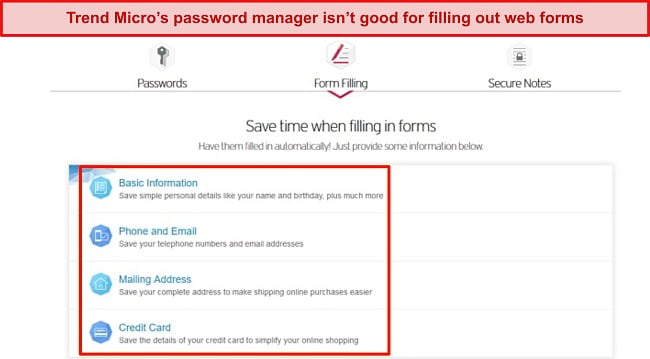
Due to this, I noticed that Trend Micro couldn’t fill out complex web forms. It also couldn’t auto-fill passwords in non-standard login pages. It also flagged some strong passwords and marked them as weak, so its password auditor isn’t as accurate as I had hoped.
Overall, Norton offers a better and more well-integrated password manager than Trend Micro. Trend Micro’s password manager offers elementary functions. Although it uses 256-bit encryption to keep your passwords safe, it doesn’t provide two-factor authentication, so there’s always the risk that your data could be hacked.
Password Manager Winner: Norton 360
8. Gaming Mode — Norton Offers Potent Gaming Features
When it comes to gaming, both Norton and Trend Micro provide gaming modes. However, after using them, Norton’s gaming mode was slightly better, especially with features like Norton GO.
After extensively “Norton 360 for Gamers,” I learned that it offers a wide array of valuable features for gamers. I was impressed by its “Norton GO” gaming optimizer, which suspends background processes and makes more resources available for you while gaming. I ran this feature and could easily play resource-heavy games like Destiny 2 and Forza Horizon 5.
Apart from that, Norton’s “Silent Mode” comes in handy. It provides an immersive gaming experience by silencing notifications (except critical security alerts) when you’re gaming full-screen.
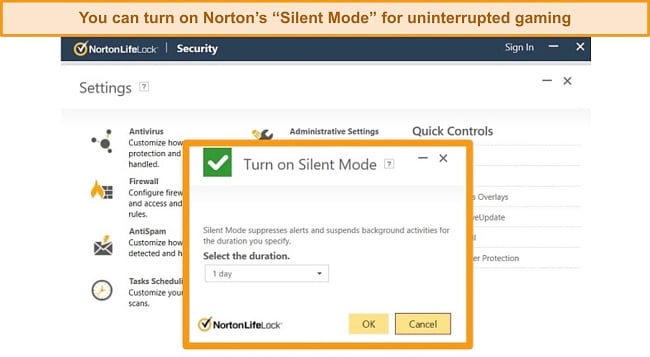
Trend Micro includes a “Mute Mode,” which works the same way as Norton’s “Silent Mode.” It mutes all non-essential notifications from popping up on your screen when you’re gaming. I used it and I was able to enjoy my gaming sessions without any interruptions.
I would have liked it if Trend Micro offered a feature that optimizes your resources, boosting gaming performance. Unfortunately, it couldn’t improve performance in games like Forza Horizon 5.
Gaming Mode Winner: Norton 360
9. Optimization Tools — Norton and Trend Micro Offer Excellent Optimization Tools
I was pleased to see that both Norton and Trend Micro provide ample optimization tools that improve your system performance, so I’d call this round a draw.
You can find Norton’s optimization tools under the “Performance” tab on its dashboard. You’ll find various tools, including Startup Manager, Optimize Disk, and a remove unnecessary files feature, among others.
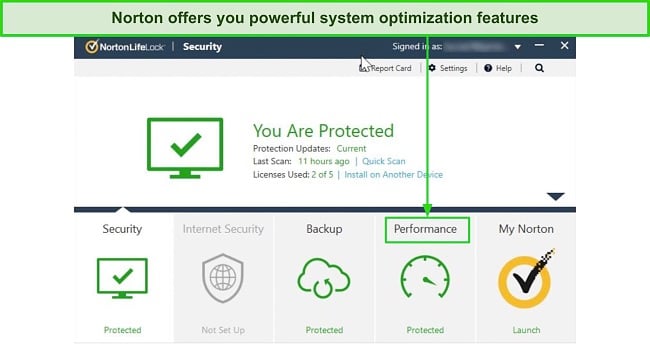
I especially liked Norton’s Startup Manager and Optimize Disk features! With the Startup Manager, I could see which programs and apps launched automatically on system bootup and used system resources. I easily removed the unnecessary apps using the Startup Manager and noticed that my boot time got faster.
I also used Norton’s Optimize Disk feature, which defragments your hard drive and removes junk and unnecessary files to free up space. It automatically does that if your disk is more than 10% fragmented. After optimizing my disk, I noticed that my PC had become slightly faster than before. If you have a mid-tier system, the impact is likely to be more significant.
Trend Micro also features a variety of optimization tools, but what I liked the most was that it detected performance issues in its Quick Scan, which was convenient. I used PC Health Checkup to check my PC for vulnerabilities.
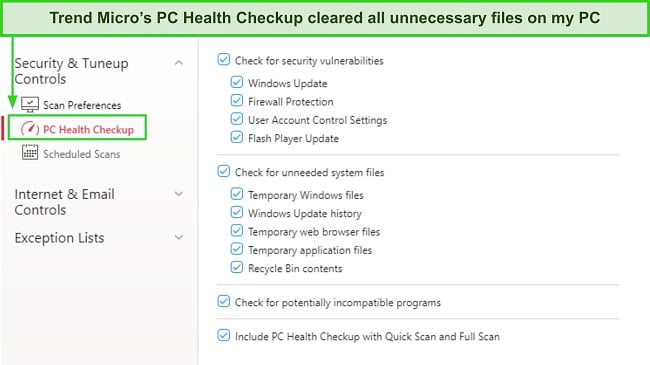
Overall, I was impressed by Norton’s and Trend Micro’s optimization tools. Both contenders have excellent PC tuneup toolsets that boost your computer’s performance.
Optimization Tools Winner: Tie
10. Other Features — Trend Micro Offers More Useful Extras
I initially assumed Norton would offer more extra features than Trend Micro, but I was surprised to find out it was the other way round. Apart from the features discussed above, Norton provides cloud storage on all its plans. That’s the only advantage Norton has over Trend Micro in this department.
On the other hand, Trend Micro delivers more extra security features than Norton. I especially liked its Fraud Buster, which protects all your email addresses from scams and phishing emails. I used it to generate a detailed report for my email address and was relieved to find that my data hadn’t been compromised.

I also liked Trend Micro’s “Privacy Protection” feature, which lets you manage your privacy on social media. It automatically checks your social media accounts and provides recommendations on enhancing your privacy.
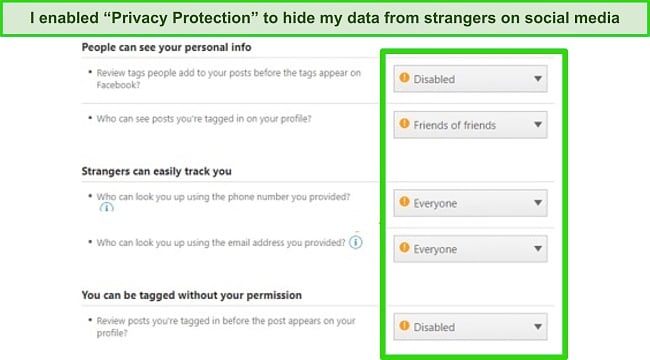
Although Trend Micro hosts more features than Norton, keep in mind that it doesn’t have a firewall, which I think is essential for online protection. Having the above-mentioned features definitely helps, though. I would have also appreciated it if Trend Micro offered a cloud storage option like Norton with its antivirus plans.
Other Features Winner: Trend Micro
11. Device Compatibility — Norton Supports a Wider Range of OS Versions
Both Norton and Trend Micro provide easy-to-use apps for desktop (Windows and Mac) and mobile (iOS and Android), but Norton is compatible with a wider range of OS versions.
Norton has desktop and mobile apps — its Windows desktop app is compatible with Windows XP (32-bit), Windows Vista, and Windows 7 through 11. Its Mac app is compatible with macOS 10.10 (Yosemite) or later.
Its iOS and Android apps are compatible with iOS 8.0+ and Android 8.0+, respectively. I found both its desktop and mobile apps easy to use and have an intuitive dashboard, making it simple to use even for beginner users.
Norton’s mobile apps offer fewer features than its desktop apps, namely virus scanning, privacy report, WiFi security, web protection browser, and call blocking. Remember that its iOS app doesn’t support real-time protection, but that isn’t very concerning since iOS runs apps in discrete “sandboxes,” making it much safer.
Trend Micro also has desktop apps for Windows and Macs, which are incredibly easy to use. When I installed its Windows app, I liked that Trend Micro showed me all the features I could use on my plan.
I also used its Android mobile app, and it was as neatly arranged as the desktop app, and I could easily navigate the dashboard. Both the iOS and Android apps have the same user-friendly interface and include the same features, such as a virus scanner, Web Guard, WiFi Checker, Pay Guard, App Manager, and System Tuner.
Norton’s AntiVirus plan supports 1 desktop device (not a mobile device). Its Standard plan, however, adds support for mobile devices, so you can use it on a Mac, Windows, smartphone, or tablet. If you have more devices to protect, you should get the Deluxe plan, which supports up to 5 devices.
Overall, I was impressed by Trend Micro’s ease of use, but unfortunately, it doesn’t support many OS versions like Norton. It’s compatible with macOS 10.15+, Windows XP or higher, iOS 11 or higher, and Android 5.0 or higher.
Device Compatibility Winner: Norton 360
12. Customer Service — Trend Micro Offers More Support Options
Norton and Trend Micro provide excellent customer service, but Trend Micro offers more support options. It also provides better phone support than Norton.
Norton offers 3 customer support options — a 24/7 live chat, phone support, and a community forum, where you can find troubleshooting guides. I recommend using its live chat, as it’s the fastest way to get support. You just need to fill out a contact form on its website, and you’ll be connected to a support agent in a matter of minutes.
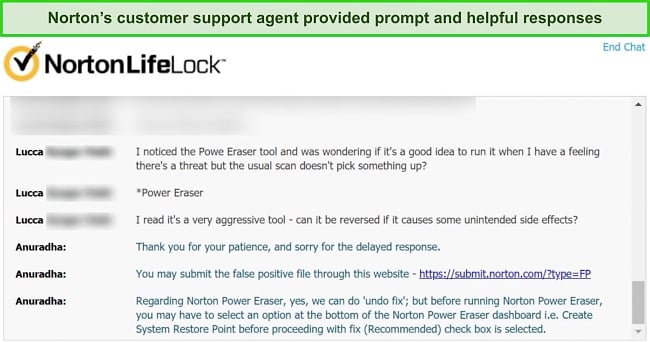
In comparison, Trend Micro’s live chat was similar. I filled out the live chat form, and it took about 2 minutes to connect to an agent. The agent was knowledgeable and competent and answered my queries to my satisfaction. I was glad to learn that the chat is available in 29 languages.
I also tested Norton’s phone support, which is available in 53 countries and several languages, including Spanish, French, German, and more. You must fill out an online form on Norton’s website and call the number to get phone support. I was on hold for approximately 10 minutes before an agent took my call.
Comparatively, Trend Micro’s phone support depends on your subscription. For standard users (up to the “Maximum Security” plan), it provides phone support during its business hours. For premium users, Trend Micro offers 24/7 phone live support. I asked the agent about the “Pay Guard” feature and received a detailed response, clarifying my concern.
Norton also has a vibrant community support forum available in multiple languages, where you can find answers to problems other users have experienced using the antivirus. The solutions are provided by moderators, members, and, at times, Norton’s employees. You might have to dig around a bit before you find answers, but from my experience, you won’t find very detailed answers there.
Trend Micro offers an additional customer support option — email support. I emailed the support team my query about the VPN, and it took 7 hours before I got a reply — that’s a bit long, considering the standard waiting time is about 3 to 4 hours. However, I was happy with the comprehensive reply I got from the support team.
In summary, both Norton and Trend Micro provide great customer support, but Trend Micro offers a few additional options.
Customer Service Winner: Trend Micro
13. Price — Norton Provides Better Overall Value
Norton offers a better value for money than Trend Micro, especially on its mid-tier plans. It has 4 plans — AntiVirus Plus, Standard, Deluxe, and Premium, each providing incremental cloud storage. If you have more than 1 device to protect, I suggest you go for the Deluxe or Premium plans because they support up to 5 and 10 devices, respectively.
Although Trend Micro provides good protection, its plans are overpriced for the value they provide. I think “Maximum Security” provides the best value for money, as it includes most of the essential features of a decent antivirus.
Price Winner: Norton 360
14. Free Version — Trend Micro Offers a Handful of Free Tools
Unfortunately, neither Norton nor Trend Micro offers a free plan, but that doesn’t mean you can’t try them out risk-free.
Trend Micro provides several free tools and apps, such as “Virus Scan,” “Home Network Scan,” “Performance Scan,” and “Browsing History Scan.” It’s terrific to have such features if you want to use Trend Micro for free, but, unfortunately, they won’t provide perfect protection.
For instance, when I downloaded the free virus scanner, it failed to detect some of the zero-day malware on my PC, providing a detection rate of 94%, which is lower than the industry average. Therefore, I won’t recommend using the free features if you’re looking for airtight protection for your device.
Trend Micro also features a free tuneup app called “HouseCall” and “Mobile Security.” House Call scans your PC and Mac for vulnerabilities and fixes them. Similarly, Mobile Security protects your iPhone or Android phone from phishing scams and keeps online threats at bay, letting you surf the web safely.
Free Version Winner: Trend Micro
15. Money-Back Guarantee — Norton Provides a 60-Day Refund Policy
Norton provides a generous 60-day money-back guarantee, whereas Trend Micro has a 30-day refund policy. However, as far as using the antivirus risk-free is concerned, both contenders provide 60 days of risk-free use since Trend Micro includes a 30-day free trial apart from its 30-day money-back guarantee.
I tested Norton’s refund policy and requested a refund via live chat. I received a confirmation email soon after and got a refund within 5 days.
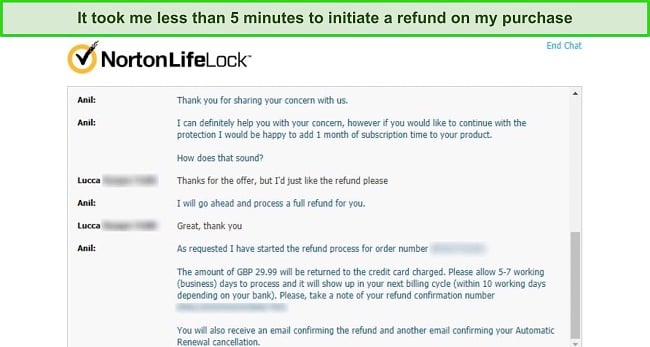
Next, I tested Trend Micro’s money-back guarantee. I initiated a refund request via live chat, and the agent asked me my license number and reason for canceling. She then offered to extend 3 months on my subscription without additional cost, which I declined. The entire process took about 15 minutes, but I wasn’t as pleased with the delay of 2 days before I got an email confirmation for my refund. I got my money back after 7 days.
Money-Back Guarantee Winner: Norton 360
And the Winner Is… Norton 360
After testing Norton and Trend Micro extensively across multiple areas, I concluded that Norton outperformed its competitor in almost every crucial area. It successfully went through my thorough scanning and malware-detection tests, offering flawless detection scores and instant protection.
- Virus Scanner — Norton 360
- Real-Time Malware Protection — Norton 360
- System Performance — Norton 360
- VPN — Norton 360
- Parental Controls — Norton 360
- Firewall — Norton 360
- Password Manager — Norton 360
- Gaming Mode — Norton 360
- Optimization Tools — Norton 360
- Other Features — Trend Micro
- Device Compatibility — Norton 360
- Customer Service — Trend Micro
- Price — Norton 360
- Free Version — Trend Micro
- Money-Back Guarantee — Norton 360
The only areas where Trend Micro stood out were customer service, its free tools, and other features. It provides a few extra features than Norton, such as “Fraud Buster” and “Privacy Protection.” It also has an extra customer support option (email support) than Norton. Moreover, you can try out Trend Micro risk-free with its 30-day free trial, and if you’re still unsure of committing, you can always use its 30-day money-back guarantee.
Overall, Norton is the clear victor of this showdown. It easily surpassed Trend Micro in almost every aspect, especially in terms of virus detection and real-time protection. Also, Norton’s firewall is one of the most advanced I’ve seen, whereas Trend Micro doesn’t have one at all. I highly recommend you try out Norton for yourself with its generous 60-day money-back guarantee.
Overall Winner: Norton 360




